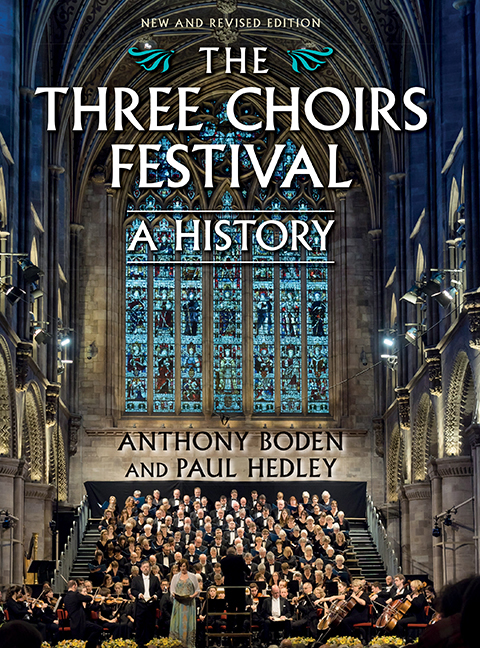Book contents
- Frontmatter
- Contents
- List of Illustrations
- Preface
- Acknowledgements
- List of Abbreviations
- List of Cathedral Organists
- 1 Origins
- 2 A Fortuitous and Friendly Proposal
- 3 A Numerous Appearance of Gentry
- 4 ‘The Musick of my Admiration Handel’
- 5 The Gentlemen and the Players
- 6 Avoiding Shipwreck
- 7 Prima voce
- 8 Favourites and Flops
- 9 Sacred and Profane
- 10 Froissart
- 11 The Unreasonable Man
- 12 The Dream
- 13 Beyond these Voices
- 14 An Essentially English Institution
- 15 The Elgar Festivals
- 16 Dona nobis pacem
- 17 Recovery
- 18 Association
- 19 A New Epoch
- 20 Jubilee
- 21 Theme with Variations
- 22 Houses of the Mind
- 23 ‘A Gold-Plated Orchestra’
- 24 A New Millennium
- 25 Reorganisation
- 26 An Invitation to the Palace
- Appendix Three Choirs Festival Timeline
- Select Bibliography
- Index
- Plate section
3 - A Numerous Appearance of Gentry
Published online by Cambridge University Press: 11 August 2017
- Frontmatter
- Contents
- List of Illustrations
- Preface
- Acknowledgements
- List of Abbreviations
- List of Cathedral Organists
- 1 Origins
- 2 A Fortuitous and Friendly Proposal
- 3 A Numerous Appearance of Gentry
- 4 ‘The Musick of my Admiration Handel’
- 5 The Gentlemen and the Players
- 6 Avoiding Shipwreck
- 7 Prima voce
- 8 Favourites and Flops
- 9 Sacred and Profane
- 10 Froissart
- 11 The Unreasonable Man
- 12 The Dream
- 13 Beyond these Voices
- 14 An Essentially English Institution
- 15 The Elgar Festivals
- 16 Dona nobis pacem
- 17 Recovery
- 18 Association
- 19 A New Epoch
- 20 Jubilee
- 21 Theme with Variations
- 22 Houses of the Mind
- 23 ‘A Gold-Plated Orchestra’
- 24 A New Millennium
- 25 Reorganisation
- 26 An Invitation to the Palace
- Appendix Three Choirs Festival Timeline
- Select Bibliography
- Index
- Plate section
Summary
IN his later years, William Hine seems to have become disillusioned with his provincial lot at Gloucester. The Gloucester Journal of 19 September 1722 has a reference to ‘A Consort of Vocal and Instrumental Musick’ given in his benefit, and this included ‘several songs in English and Italian with their Symphonies, perform'd by Mr Priest's FAMOUS BOY from Bristol’,1 but after that, nothing. And by 1730 his life was, in any case, drawing to a premature close. He died on 28 August in that year, aged forty-three, just days before the start of a Gloucester Meeting of the Three Choirs.
Life in eighteenth-century England may not have been quite so nasty and brutish as in former times, but it was very often short. Hine was buried in the cloisters of Gloucester Cathedral, where a small tablet to his memory, erected a few paces to the left of the Chapter House door, bears the following inscription:
M. S. Gulielmi Hine,
hujusce Ecclesiae Cathedralis
Organistae et Choristarum Magistri.
Qui morum candore et eximia in
arte coelesti peritia omnium amorem
et admirationem, venerandi autem
Decani et Capituli gratium (voluntario
Stipendii incremento testatum) meritissimo
affectus est. Morte pramatura ereptus
Obiit Aug. 28vo, Anno Christi 1730, atatis 43.
Sacred to the Memory of William Hine,
Organist and Master of the Choristers of this Cathedral Church,
whose upright character and outstanding mastery of the heavenly art
most deservedly won the admiration and love of all,
as well as the favour of the Reverend Dean and Chapter,
shown by their decision voluntarily to increase his salary.
Snatched away by premature death he died August 28th
in the year of Christ 1730, aged 43.
A further couplet was added to the inscription, recording the death of Alicia Hine, also at the age of forty-three, on 28 June 1735.
Hine's compositions, chiefly consisting of music for Gloucester Cathedral, remained unpublished in his lifetime but, after his death, Alicia had published by subscription Harmonia Sacra Glocestriensis, or Select Anthems for 1, 2, and 3 Voices, &c.
- Type
- Chapter
- Information
- The Three Choirs Festival: A HistoryNew and Revised Edition, pp. 28 - 39Publisher: Boydell & BrewerPrint publication year: 2017

